Share
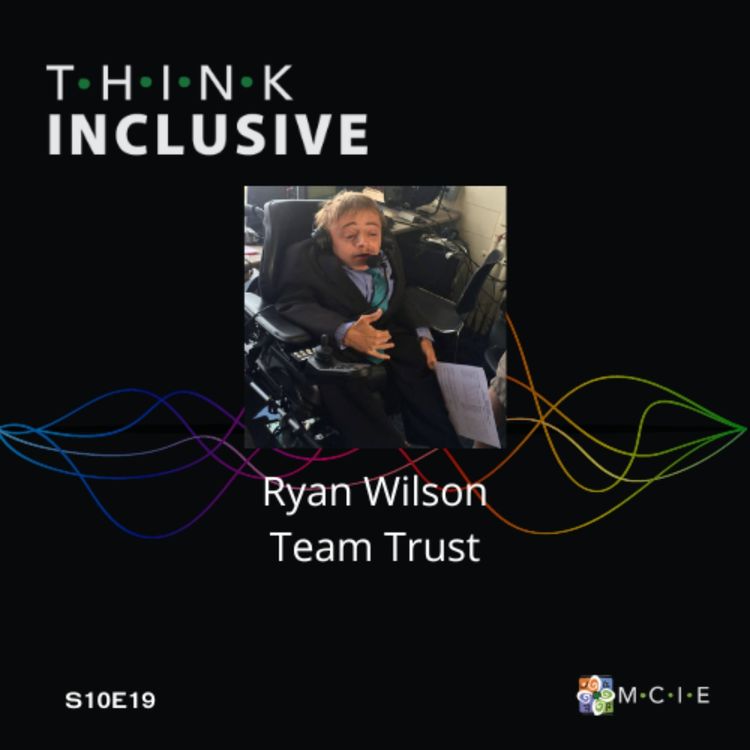
Think Inclusive
Ryan Wilson | Team Trust
For this episode, I speak with Ryan Wilson, the director of Team Trust Productions. Ryan created Team Trust to help mission-driven organizations reach and serve their communications. He wants to help connect people with the entities, organizations and resources they deserve to grow and flourish. Ryan’s heart is advocating for persons with disabilities, because he is one. Ryan has befriended persons with the same disability as his (Osteogenesis Imperfecta), and established life-long relationships with persons with visual impairments, hearing impairments, cognitive disabilities and mental illnesses. Each one of these relationships changed his life.
Thanks for listening, and if you haven't already, please give us a ⭐⭐⭐⭐⭐ review on Apple Podcasts or Spotify.
Otter.ai Transcript: https://otter.ai/u/Upr-Nwv5MGzuBu_HNMWlmkaRMGo
PDF Transcript: https://3bd6e695-b492-4878-afa9-f79d8b09e0c4.usrfiles.com/ugd/3bd6e6_1f3eabbdc10a41ef91270b7847d98415.pdf
Show Notes: https://bit.ly/TI-Ryan-Wilson
Cover Art Image Description: black background; think inclusive logo in the top left; rainbow-colored waves overlayed with the headshot of Ryan Wilson; text reads: Ryan Wilson, Team Trust; MCIE logo in the bottom right
Credits
Think Inclusive is written, edited, and sound designed by Tim Villegas and is produced by MCIE.
Original music by Miles Kredich.
Support Think Inclusive by becoming a patron!
Thank you to our sponsor, TogetherLetters.
More episodes
View all episodes
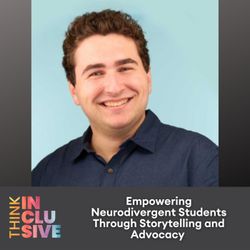
32. Empowering Neurodivergent Students Through Storytelling and Advocacy
41:02||Season 12, Ep. 32About the Guest(s): Riley Mulcahy is the founder and Executive Director of The Riley Project, a nonprofit organization focused on storytelling and community building for individuals with learning differences. A graduate of St. Mary's College of California with a background in English and Creative Writing, Riley is also the Marketing and Admissions Associate at Compass High School, where he champions inclusive, strengths-based education. He is an advocate for neurodiversity, dedicating his efforts to initiatives like the Neurodiversity Education Series, aimed at creating supportive systems for neurodivergent individuals. Episode Summary: In this enlightening episode of Think Inclusive, host Tim Villegas chats with Riley Mulcahy, a prominent advocate for individuals with learning differences. Riley discusses his journey with dyslexia and his commitment to creating inclusive environments through storytelling and advocacy. As the founder of the Riley Project, Riley sheds light on challenges and triumphs within the landscape of neurodivergent education. The episode gives listeners a deep dive into the concepts of multisensory instruction, the implications of the "Wait to Fail" model in schools, and the pivotal role of early intervention in supporting students with learning differences. Listeners will gain insights as Riley emphasizes the transformative power of storytelling in social change, drawing parallels between historical movements and current advocacy for neurodiversity. With a focus on practical strategies and technologies aiding learning differences, the discussion encompasses everything from reading interventions to the potential of AI-driven education tools. Whether you're an educator, parent, or advocate, this episode is packed with valuable information on fostering inclusive, supportive educational environments where all students can excel. Complete show notes and transcript.Key Takeaways: Power of Storytelling: Riley highlights how storytelling has been central to social justice movements, emphasizing its potential to drive change in the education system for those with learning differences. Multisensory Reading Instructions: Discussing the effectiveness of multisensory instruction methods, Riley underscores its importance for students struggling with traditional learning approaches. Early Intervention and Support: The episode stresses the necessity of early intervention and the creation of strength-based IEPs to help neurodivergent students thrive. Future of Education Technology: A spotlight on assistive technologies, text-to-speech, and AI as tools to help students with learning differences achieve better outcomes. Inclusion and Advocacy: The Riley Project aims to create safe spaces for individuals to share experiences, thus fostering a community of support and awareness. Resources: The Riley ProjectEducating All Learners AllianceDyslexic Advantage Proust and the Squid Thank you to our sponsor, IXL.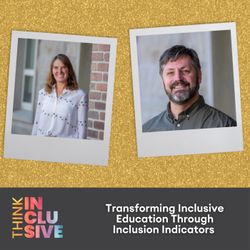
31. Transforming Inclusive Education Through Inclusion Indicators
01:03:20||Season 12, Ep. 31About the Guest(s):Alissa Rausch is a dedicated advocate for inclusive education rights, especially for young children with disabilities and various intersectional identities. Based at the University of Denver, she has extensive experience as a provider, program leader, educator, and technical assistance provider, notably developing inclusive programs and participating actively in legislative initiatives with organizations like Disability Law Colorado and the Early Childhood Technical Assistance (ECTA) Center.Ben Riepe is a Senior Project Manager at the Positive Early Learning Experiences Center at the University of Denver, contributing significantly to ECTA and the National Center for Pyramid Model Innovations. With 13 years supporting Head Start Classrooms as a teacher and coach, Ben focuses on embedding evidence-based inclusive practices into classrooms and communities.Episode Summary:Delve into a transformative discussion on the Think Inclusive Podcast with Tim Villegas, featuring an insightful conversation with Alissa Rausch and Ben Riepe from the University of Denver. They discuss the significance of the Early Childhood Technical Assistance Center's inclusion indicators, designed to guide systems at varying levels, like state and community, towards enhancing inclusive practices, aiming for a profound societal impact.In this episode, Alissa and Ben emphasize the critical role of systems in fostering inclusive environments for children, particularly those with disabilities. They explore the implementation science behind these indicators and how it supports sustainable and meaningful inclusive practices. Through poignant real-world examples and insights, they expound on the barriers families face and the power of family partnerships in achieving truly inclusive educational settings. Their experiences and collaborative work highlight opportunities for systemic change, especially through intentional community-based approaches and systems-level transformation, positioning early childhood inclusion as a foundational element of lifelong success.Complete show notes and transcript: https://mcie.org/think-inclusive/transforming-inclusive-education-through-inclusion-indicators/Key Takeaways:-Inclusion Indicators: Developed by ECTA, the indicators serve as a North Star for programs implementing inclusive practices across various levels such as state, community, and local programs.-Systems Approach to Inclusion: Emphasizes working at every level of the educational ecosystem, from state policies to individual classrooms, ensuring comprehensive support for inclusive practices.-Family Partnerships: Building genuine partnerships with families is critical, recognizing them as co-constructors in the journey of inclusion, thereby facilitating better educational outcomes.-Long-Term Impact: Highlighting the necessity of early childhood inclusion as a foundation for lifelong educational and community success.-Implementation Science: Using strategic, science-based processes for planning and executing inclusive practices, aiming for scalable and sustainable change.Resources:ECTA Center: https://ectacenter.org/Disability Law Colorado: https://disabilitylawco.org/Thank you to our sponsor, IXL: https://www.ixl.com/inclusive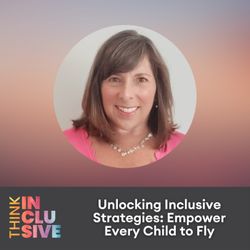
30. Unlocking Inclusive Strategies: Empower Every Child to Fly
58:56||Season 12, Ep. 30About the Guest(s):Jani Kozlowski is a renowned early childhood professional, boasting over 30 years of experience. She is an accomplished author and speaker, serving as a technical assistance specialist and consultant. Jani focuses on supporting the development of young children and their families, with expertise in early childhood disability services, learning environments, and social-emotional development. She currently leads initiatives at the Frank Porter Graham Child Development Institute, University of North Carolina, Chapel Hill. Jani is the author of "Every Child Can Fly: An Early Childhood Educator's Guide to Inclusion" and its family-oriented companion, "Empowering Your Child to Fly."Episode Summary:In this compelling episode of Think Inclusive, host Tim Villegas engages Jani Kozlowski, a notable expert in early childhood inclusion, in a discussion about advocating for inclusive education for young children with disabilities. The episode begins with Jani sharing personal insights on the importance of inclusion for preschool children, emphasizing that early inclusion sets a positive trajectory not only for children with disabilities but also for their peers without disabilities. Her approach to this often daunting prospect for families highlights strategies that aim to demystify special education processes and the legal foundations surrounding inclusion.This episode delves deep into the practical aspects of advocating for and implementing inclusive education practices. Jani discusses her recent adaptation of "Every Child Can Fly" into a version for families, illustrating her dedication to making vital information accessible to parents. Through interviews with 15 families, Jani brings authenticity and emotional depth to the conversation, offering real-world strategies for navigating special education systems. Emphasizing a long-term vision for inclusion, Jani articulates the significance of forging robust partnerships between families and educators, underscoring the myriad benefits of fostering inclusive learning environments.Complete show notes and transcript: https://mcie.org/think-inclusive/unlocking-inclusive-strategies-empower-every-child-to-fly/Key Takeaways:-Early childhood inclusion sets the foundation for a child's future educational trajectory, impacting both those with and without disabilities.-Understanding the legal frameworks and rights surrounding special education is crucial for parents advocating for their children's inclusive education.-Building strong relationships between families and teachers facilitates collaboration and problem-solving, crucial for achieving successful inclusion.-A clearly defined vision for a child's educational journey empowers families and guides school teams in decision-making processes.-Leveraging supportive networks and existing resources, like OSEP-funded parent centers, can enhance advocacy efforts and access to inclusive placements.Resources:Jani's website: https://everychildcanfly.com/Parent Center Hub: https://www.parentcenterhub.org/Forget Me Not Documentary: https://forgetmenotdocumentary.com/CADRE: https://cadreworks.org/Thanks to our sponsor, IXL: https://www.ixl.com/inclusive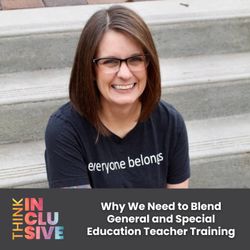
29. Why We Need to Blend General and Special Education Teacher Training
01:03:26||Season 12, Ep. 29About the Guest(s):Jen Newton is an Associate Professor at Ohio University with a dedicated career in inclusive education spanning 25 years. Her expertise encompasses anti-racist, anti-ableist education, early childhood inclusion, and inclusive teacher preparation. Beginning her career as an early interventionist and inclusive pre-kindergarten teacher, Dr. Newton now focuses on teacher education, inclusion consulting, and research. She actively contributes to local, regional, and national discussions on advancing inclusive education practices.Episode Summary:In this episode of Think Inclusive, hosted by Tim Villegas, the spotlight is on Dr. Jen Newton's insights into the challenges of preparing educators for including students with diverse learning needs in general education classrooms. With decades of experience in inclusive education, Dr. Newton provides a critical analysis of the current gaps in teacher preparation and the need for an inclusive pedagogical approach.This conversation delves into the systemic limitations that hinder the effectiveness of inclusive practices in education. Tim and Jen outline practical strategies for empowering both general and special education teachers to adapt and modify curricular materials effectively. They argue for comprehensive teacher training focusing on modifications, accommodations, and a deeper understanding of learners with extensive support needs. The dialogue also touches on the political aspects, revealing how educational policies and legislative agendas shape the current state of inclusion in schools. As key legislation remains outdated, the discussion underscores the urgency for updated educational policies that reflect current understandings of disabilities and mental health.Complete show notes + transcript: https://mcie.org/think-inclusive/why-we-need-to-blend-general-and-special-education-training/Key Takeaways:-Understanding the current lack of comprehensive inclusive training provided to general educators and advocating for collaborative teaching practices.-Addressing the political landscape and its influence on inclusive education and teacher preparation frameworks.-The significance of inclusive licenses for teachers, which integrate general and special education training.-How a focus on collaboration between teachers can facilitate effective adaptations to accommodate diverse learning needs.-The impact of federal and state educational policies on practical inclusion efforts in schools.Resources:Jen website: https://www.teachingisintellectual.com/Books Mentioned:"Wolf at the Schoolhouse Door" by Jennifer Berkshire and Jack Schneider"Troublemakers: Lessons in Freedom from Young Children at School" by Carla Shalaby"Demystifying Disability" by Emily LadauPodcast Mentioned: Have You Heard hosted by Jennifer Berkshire and Jack SchneiderThanks to our sponsor, IXL: https://www.ixl.com/inclusive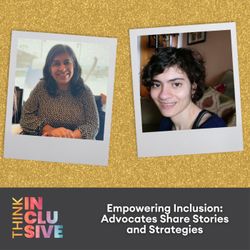
28. Empowering Inclusion: Advocates Share Stories and Strategies
50:58||Season 12, Ep. 28About the Guest(s):Brilly Semenova: Brilly is a passionate advocate for individuals with disabilities, having started her advocacy journey during her middle school years. She is based in Maryland but operates nationally, providing resources and support to families and individuals. Her focus covers education, employment, social skills, and legal guidance for navigating benefits for people with disabilities.Nisha Batra: Nisha is a dedicated Early Childhood Educator and passionate disability advocate. She was recently honored with the King Charles III Award in recognition of her impactful advocacy work. Nisha firmly believes that normalizing differences empowers individuals and fosters a more inclusive and equitable society.Episode Summary:In this enlightening episode of Think Inclusive by Tim Villegas, inclusion advocates Brilly Semenova and Nisha Batra share their profound insights and personal journeys in promoting inclusive practices for individuals with disabilities. Brilli recounts her experiences from initiating mentorship programs in middle school to providing comprehensive resources for families navigating educational and legal systems. Her story emphasizes the importance of inclusivity in fostering supportive environments for individuals with different abilities.Nisha Batra brings a unique perspective with her background in early childhood education and her personal experience with a learning disability. She discusses the critical importance of celebrating diversity within educational settings and normalizing differences among students. By sharing her journey and professional insights, Nisha highlights the potential transformation inclusion can bring about in educational settings, fostering an environment where every student feels supported and valued.Complete show notes + transcript: https://mcie.org/think-inclusive/empowering-inclusion-advocates-share-stories-and-strategies/Key Takeaways:-Brilly Semenova illustrates the need for mentorship and guidance programs for young individuals with disabilities to promote self-advocacy and inclusive environments.-Nisha Batra emphasizes the significance of acknowledging and celebrating diversity in classrooms, advocating for normalization of differences among students.-Both advocates highlight the necessity for educational and societal systems to be readily inclusive, moving towards environments that support diverse learners without needing them to 'be ready' first.-The conversation underscores the challenges and opportunities found within advocacy, highlighting the transformative power inclusion holds at both individual and systemic levels.-Practical examples of advocacy efforts and successful inclusion practices are discussed, showcasing real-world applications.Resources:Helpipedia: https://helpipedia.org/Nisha's Instagram: @TheSwanTransformation: https://www.instagram.com/theswantransformation/Thank you to our sponsor, IXL: ixl.com/inclusive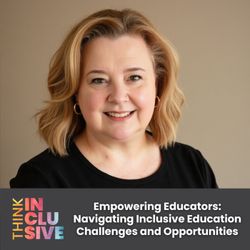
27. Empowering Educators: Navigating Inclusive Education Challenges and Opportunities
55:08||Season 12, Ep. 27About the Guest(s):Nicole Eredics is a seasoned expert specializing in inclusive education, boasting over 25 years of experience in the field. Armed with degrees in elementary and special education, Nicole began her career as an inclusion teacher in British Columbia, Canada. She is the founder of the Inclusive Class and has been instrumental in implementing inclusive systems in over 150 schools across the United States since 2008. Also an esteemed author, her best-selling book "Inclusion in Action" is a vital resource for educators aiming to foster inclusive educational settings. Currently, Nicole offers her expertise as a national presenter and trainer for the Bureau of Education and Research, as well as an education and ed-tech consultant.Episode Summary:In this engaging episode of Think Inclusive, host Tim Villegas is joined by inclusive education expert Nicole Eredics. Eredics offers valuable insights into fostering inclusive education practices within school systems. The episode kicks off with an exploration of Nicole's rich history in education and her journey from advocating for inclusion in Canada to transforming schools across the United States. As the discussion unfolds, Nicole shares her experiences working with school districts, highlighting the advancements made in personalized instruction and the integration of technology to support diverse student needs. The conversation also delves into the complexities of standardized testing, the role of co-teaching models, and the substantial influence educators have on crafting positive educational experiences for all learners.As the dialogue deepens, Eredics underscores significant changes in education, particularly the growing emphasis on individual student needs and diversity awareness. These changes have sparked an evolution in instructional practices, the use of universal design for learning (UDL), and the availability of resources enhancing teachers' capabilities. However, Nicole also sheds light on the enduring challenges, like the rigidity of standardized systems and the struggles of grading students with varying needs. Offering tactical advice, she encourages educators to begin with small, manageable changes, such as observing their current classroom practices, while leveraging technology and collaboration to enhance their inclusive teaching methods.Complete show notes + transcript: https://mcie.org/think-inclusive/empowering-educators-navigating-inclusive-education-challenges-and-opportunities-with-nicole-eredics/Key Takeaways:-Inclusive education requires a nuanced understanding of personalized instruction and the commitment to supporting diverse learners within the general education classroom.-Recent advancements highlight increased awareness of diversity and personalized instruction among educators, yet challenges like standardized testing and rigid grading systems remain barriers.-Co-teaching and Universal Design for Learning (UDL) are increasingly being embraced as vital components of inclusive educational practices.-Technology, particularly AI, is transforming how educators tackle customized learning needs, offering streamlined solutions for adapting lessons and teaching approaches.-Effective inclusive systems are bolstered by insightful leadership from administrators who understand and value inclusive practices.Resources:Nicole's book: https://amzn.to/3GdExBrVisit Nicole's website: https://www.theinclusiveclass.com/Thanks to our sponsor, IXL: ixl.com/inclusive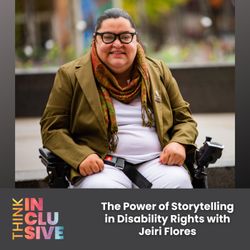
26. The Power of Storytelling in Disability Rights with Jeiri Flores
01:21:17||Season 12, Ep. 26About the Guest(s):Jeiri Flores is a Puerto Rican disability rights activist based in Rochester, New York. After earning her bachelor's degree in Sociology and African American Studies from SUNY Brockport in 2014, she pursued a master's in Human Development at the University of Rochester. As a passionate advocate for disability rights, Jeiri shares her insights on inclusion, disability, and intersectionality at colleges and conferences, aiming to enlighten and inspire change. Her mission is to empower disabled youth to redefine societal narratives around disability.Episode Summary:In this episode of Think Inclusive listeners are introduced to the compelling story and advocacy journey of Jeiri Flores, a dynamic disability rights activist. Jeiri opens up about the relentless challenges faced by disabled individuals, particularly highlighting the dehumanization and isolation embedded within societal and systemic structures. Through engaging storytelling, she discusses the critical role of love and belonging in fostering truly inclusive communities and delves into how these spaces can transform by acknowledging the humanity of every individual.Throughout the conversation, Jeiri reflects on her advocacy's roots, nurtured from a young age while translating for her family, and how her practices have evolved over time. Key themes such as navigating healthcare systems, societal expectations, and the perpetual need for systemic change are explored. Jeiri also emphasizes the power of sharing personal narratives, not only as a form of advocacy but as a way to bridge connections between diverse experiences. As she navigates topics like love, belonging, and her intersectional identity, Jeiri provides a rich tapestry of insights that resonate deeply with educators, advocates, and anyone passionate about disability rights and inclusion.Complete show notes + transcript: https://mcie.org/think-inclusive/the-power-of-storytelling-in-disability-rights-with-jeiri-flores/Key Takeaways:Authenticity and vulnerability are essential in effective advocacy, as they help build deeper connections and understanding.Navigating healthcare and societal systems poses significant challenges for disabled individuals, often leading to stress and self-segregation.Inclusion spaces thrive on recognizing every individual's humanity and embracing differences, with love serving as a guiding principle.Storytelling in advocacy can be a powerful tool for raising awareness and encouraging systemic change.The importance of engaging diverse voices in decision-making processes, particularly those directly affected by the outcomes.Resources:Jeiri on Insta: https://www.instagram.com/dangerously_gifted/Jeiri on LinkedIn: https://www.linkedin.com/in/jeiri-flores-b7bb3651/Jeiri's story about her mom: https://youtu.be/bq62Q7Cg85g?si=Il5zrhoH74ZcYRaaThank you to our sponsor, IXL: https://www.ixl.com/inclusive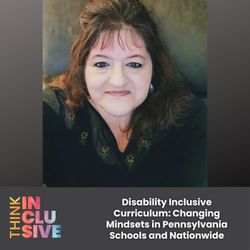
25. Disability Inclusive Curriculum: Changing Mindsets in Pennsylvania Schools and Nationwide
41:34||Season 12, Ep. 25About the Guest(s):Lisa Aquila is a dedicated advocate for disability rights and Vice Chair of the Board at Disability Equality in Education (DEE). Lisa's journey into disability advocacy began after a career as a home care attendant was cut short due to her own disability. As an education outreach specialist, she has been pivotal in lobbying for disability-inclusive curriculum legislation, co-founding the Coalition on Disability Inclusive Curriculum, and advancing the social model of disability. Her work aims to integrate disability discourse into general education, inspiring future generations to embrace diversity.Episode Summary:In this enlightening episode of Think Inclusive, host Tim Villegas welcomes Lisa Aquila, a fervent advocate for disability rights and Vice Chair at Disability Equality in Education. They explore the importance of integrating disability into K-12 education, emphasizing that disability is a natural part of human diversity. Through personal anecdotes and professional insights, Lisa outlines her journey from home care attendant to becoming a key figure in disability advocacy.Lisa shares her experience spearheading the disability-inclusive curriculum initiative, highlighting the success of the program piloted in Pennsylvania. The conversation delves into the social model of disability, focusing on how societal barriers can be dismantled through education. Both Lisa and Tim discuss the potential of early education in changing perceptions, advocating for resources and support systems that enable teachers to effectively incorporate disability studies into classrooms nationwide.Complete show notes + transcript: https://mcie.org/think-inclusive/disability-inclusive-curriculum-changing-mindsets-in-pennsylvania-schools-and-nationwide/Key Takeaways:Disability is a natural part of human diversity and should be woven into everyday conversations and education to dismantle stigma.The disability-inclusive curriculum aims to educate K-12 students on the contributions of disabled individuals, promoting understanding and acceptance.Lisa Aquila and DEE work under the principle of "Nothing About Us Without Us," ensuring that disabled voices are central in creating educational content.The pilot project in Pennsylvania offers a blueprint for disability education that could inspire similar initiatives nationwide.Teachers have continuous support for integrating these lessons into their classrooms, fostering a more inclusive generation.Resources:Disability Equality in Education (DEE): https://www.disabilityequalityeducation.org/DEE email: info@DisabilityEqualityEducation.orgCall DEE at (724)726-1155Thanks to our sponsor, IXL. https://www.ixl.com/inclusive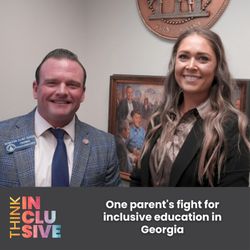
One parent's fight for inclusive education in Georgia
09:52||Season 12About the Guest(s):Chelsea Hutchings is a dedicated advocate for inclusive education, residing in Gwinnett County, Georgia. As a mother of five, with her youngest son having Down syndrome, she became intricately involved in advocating for systemic reform in special education after experiencing the challenges firsthand. Chelsea actively engages with local representatives, school board members, and community leaders to push for change and is a part of the Theo Hutchings Task Force for Inclusion. She has taken part in extensive learning experiences, including conferences and fellowship programs, to deepen her understanding and efficacy in advocacy work.Episode Summary:In this engaging bonus episode of the Maryland Coalition for Inclusive Education podcast, host Tim Villegas sheds light on the tenacious efforts of Chelsea Hutchings as she navigates the rugged terrain of advocating for inclusive education in Georgia. Meeting Chelsea at the Georgia State Capitol provided a firsthand look at her dynamic advocacy work with state representatives, including State Senator Clint Dixon.Chelsea Hutchings, a Gwinnett County parent, shares her inspirational journey advocating for inclusive education reform, driven by her direct experiences with the special education system's shortcomings. Chelsea ardently illustrates how her son, diagnosed with Down syndrome, was isolated within the educational system, leading her to champion the cause of inclusive education. By building a community-focused advocacy approach, Chelsea rallied support from local authorities, such as her city mayor, and worked on forming the Theo Hutchings Task Force for Inclusion. Throughout her advocacy journey, Chelsea highlighted the importance of being informed, persistent, and collaborative in effecting systemic change.Read the Weeklyish: https://mcie.org/think-inclusive/one-parents-fight-for-inclusive-education-in-georgia/Transcript: https://otter.ai/u/7Fv-AGGijZrPiXRl86K-dJsn7h8?utm_source=copy_url